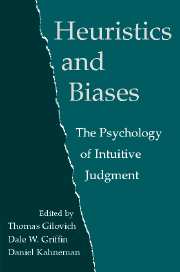Book contents
- Frontmatter
- Contents
- List of Contributors
- Preface
- Introduction – Heuristics and Biases: Then and Now
- PART ONE THEORETICAL AND EMPIRICAL EXTENSIONS
- PART TWO NEW THEORETICAL DIRECTIONS
- 22 Two Systems of Reasoning
- 23 The Affect Heuristic
- 24 Individual Differences in Reasoning: Implications for the Rationality Debate?
- 25 Support Theory: A Nonextensional Representation of Subjective Probability
- 26 Unpacking, Repacking, and Anchoring: Advances in Support Theory
- 27 Remarks on Support Theory: Recent Advances and Future Directions
- 28 The Use of Statistical Heuristics in Everyday Inductive Reasoning
- 29 Feelings as Information: Moods Influence Judgments and Processing Strategies
- 30 Automated Choice Heuristics
- 31 How Good Are Fast and Frugal Heuristics?
- 32 Intuitive Politicians, Theologians, and Prosecutors: Exploring the Empirical Implications of Deviant Functionalist Metaphors
- PART THREE REAL-WORLD APPLICATIONS
- References
- Index
27 - Remarks on Support Theory: Recent Advances and Future Directions
from PART TWO - NEW THEORETICAL DIRECTIONS
Published online by Cambridge University Press: 05 June 2012
- Frontmatter
- Contents
- List of Contributors
- Preface
- Introduction – Heuristics and Biases: Then and Now
- PART ONE THEORETICAL AND EMPIRICAL EXTENSIONS
- PART TWO NEW THEORETICAL DIRECTIONS
- 22 Two Systems of Reasoning
- 23 The Affect Heuristic
- 24 Individual Differences in Reasoning: Implications for the Rationality Debate?
- 25 Support Theory: A Nonextensional Representation of Subjective Probability
- 26 Unpacking, Repacking, and Anchoring: Advances in Support Theory
- 27 Remarks on Support Theory: Recent Advances and Future Directions
- 28 The Use of Statistical Heuristics in Everyday Inductive Reasoning
- 29 Feelings as Information: Moods Influence Judgments and Processing Strategies
- 30 Automated Choice Heuristics
- 31 How Good Are Fast and Frugal Heuristics?
- 32 Intuitive Politicians, Theologians, and Prosecutors: Exploring the Empirical Implications of Deviant Functionalist Metaphors
- PART THREE REAL-WORLD APPLICATIONS
- References
- Index
Summary
SUPPORT THEORY
A great deal of psychological research has addressed the nature and quality of people's intuitive judgments of likelihood. Much of this work has sought to characterize the simple mental operations, often termed heuristics, that govern people's assessments of probabilities and frequencies. The heuristics initially identified by Daniel Kahneman and Amos Tversky – availability, representativeness, and anchoring, among others – describe and explain many phenomena in judgment under uncertainty. These heuristics have been particularly helpful in identifying conditions under which people closely conform to, or radically deviate from, the requirements of probability theory.
Support theory, a formal descriptive account of subjective probability introduced by Tversky and Koehler (1994), offers the opportunity to weave together the different heuristics into a unified account. The theory can accommodate many mechanisms (such as the various heuristics) that influence subjective probability, but integrates them via the construct of support. Consequently, support theory can account for numerous existing empirical patterns in the literature on judgment under uncertainty.
The original works describing the major heuristics underlying likelihood judgments are presented in Kahneman, Slovic, and Tversky (1982). Previous chapters of this book contain selections from the initial statements of support theory that invoke several heuristics to account for various properties of support. Our goal in this chapter is twofold: to summarize recent developments in support theory, and to suggest some possible directions for future research.
- Type
- Chapter
- Information
- Heuristics and BiasesThe Psychology of Intuitive Judgment, pp. 489 - 509Publisher: Cambridge University PressPrint publication year: 2002
- 20
- Cited by



